人教新课标必修二Unit2 The Olympic games Reading课件(37张ppt)
文档属性
| 名称 | 人教新课标必修二Unit2 The Olympic games Reading课件(37张ppt) |
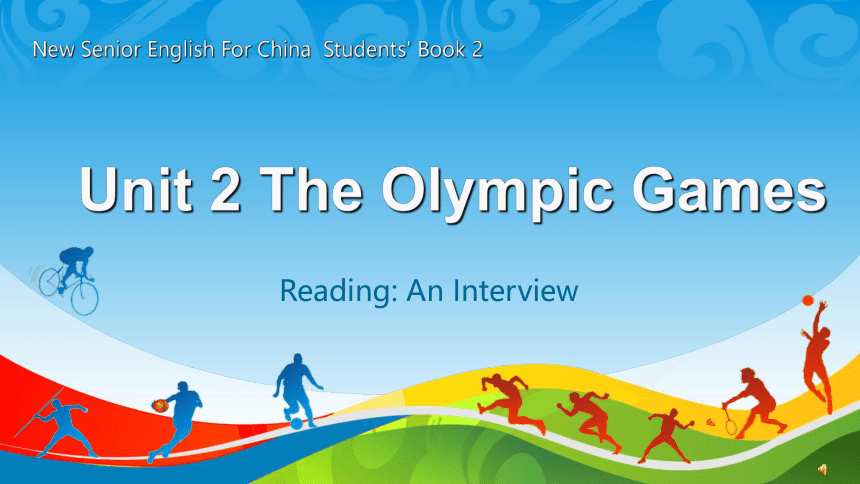
|
|
| 格式 | zip | ||
| 文件大小 | 7.7MB | ||
| 资源类型 | 教案 | ||
| 版本资源 | 人教版(新课程标准) | ||
| 科目 | 英语 | ||
| 更新时间 | 2022-02-26 00:00:00 | ||
图片预览

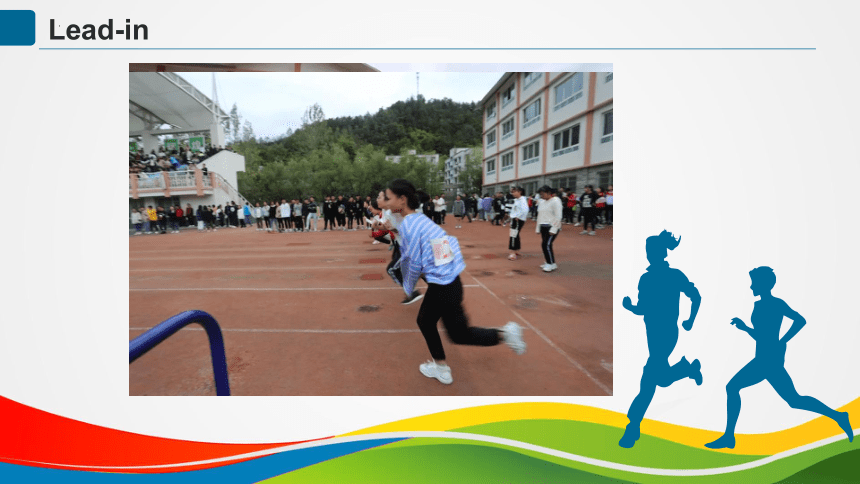
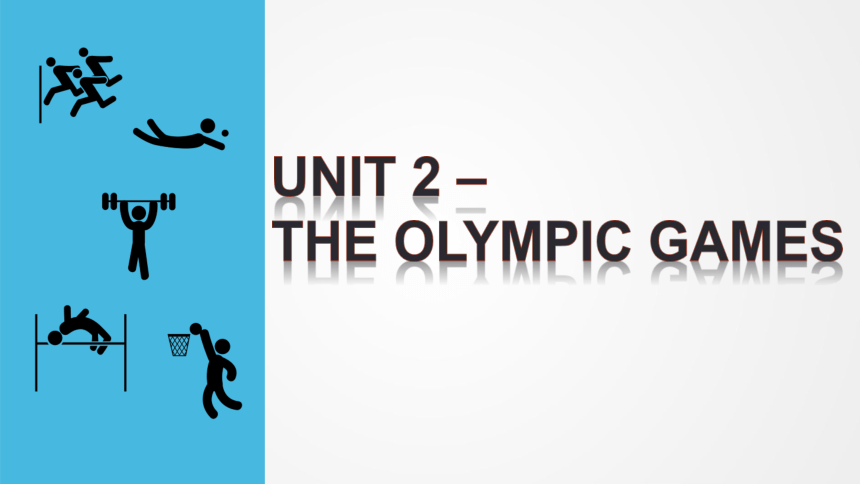
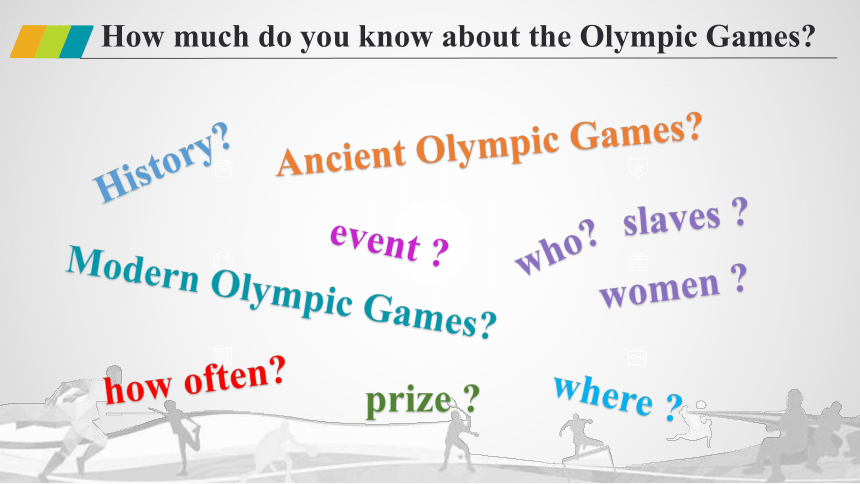
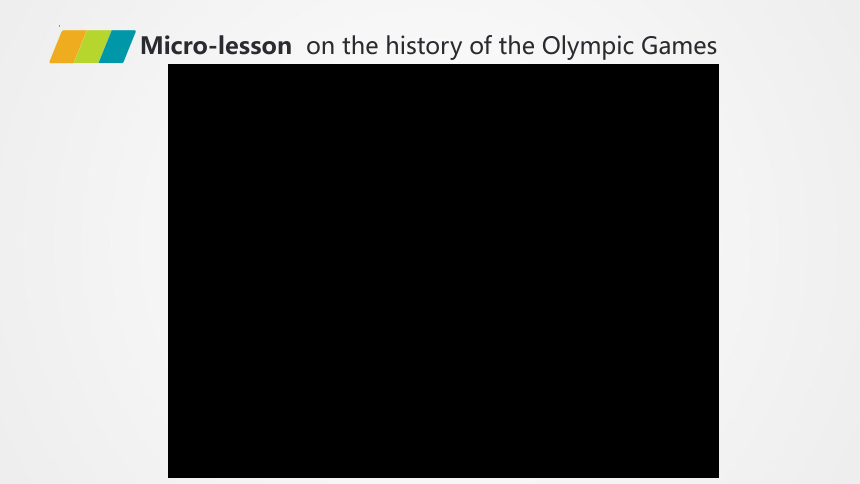

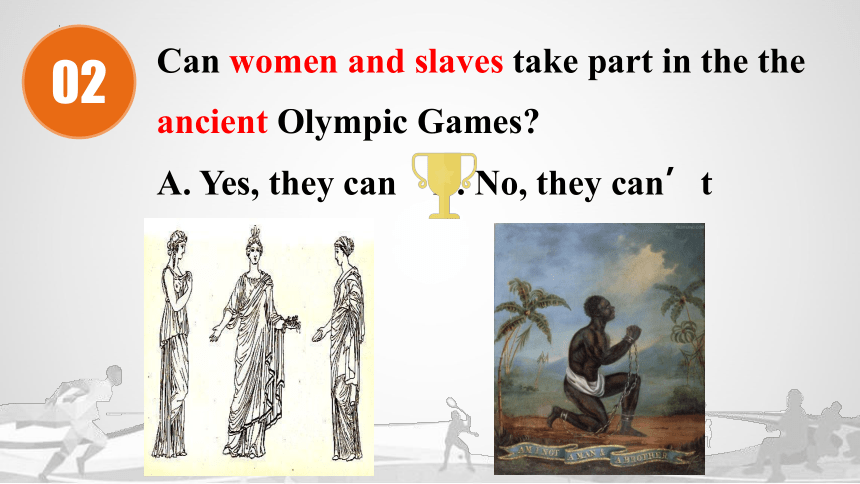
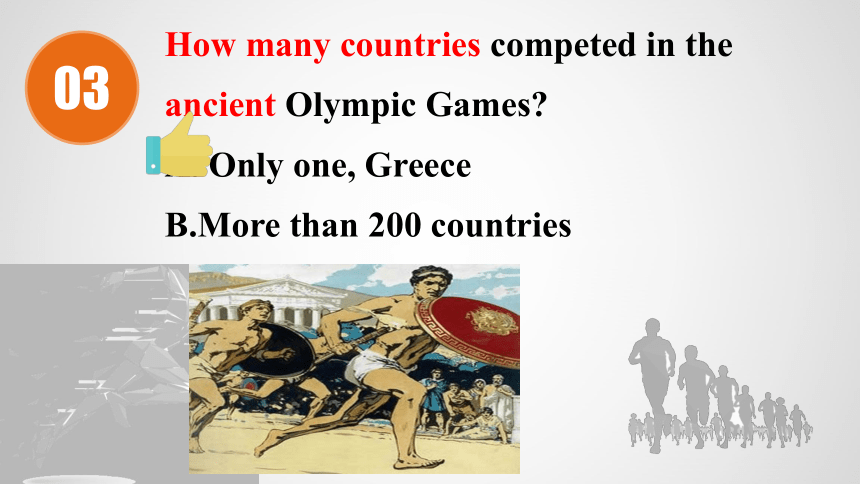
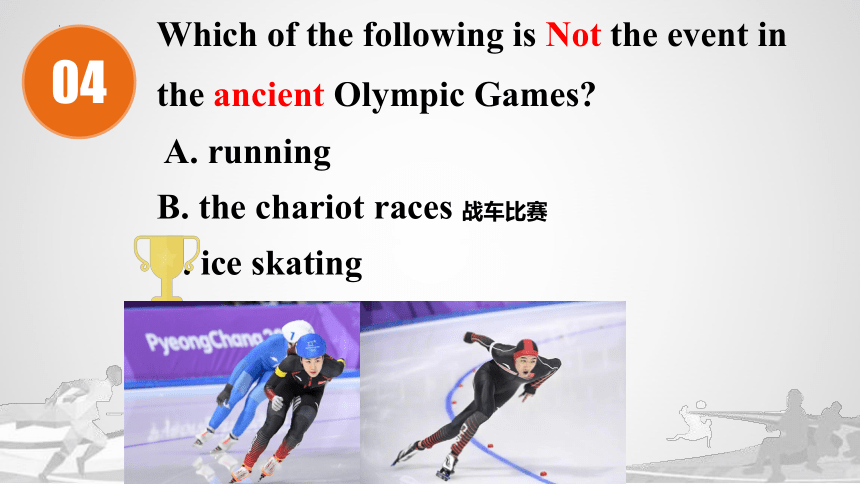
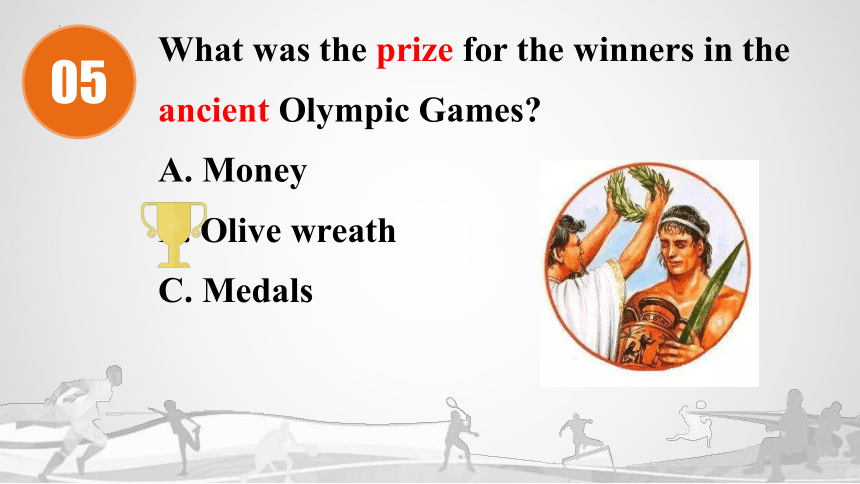
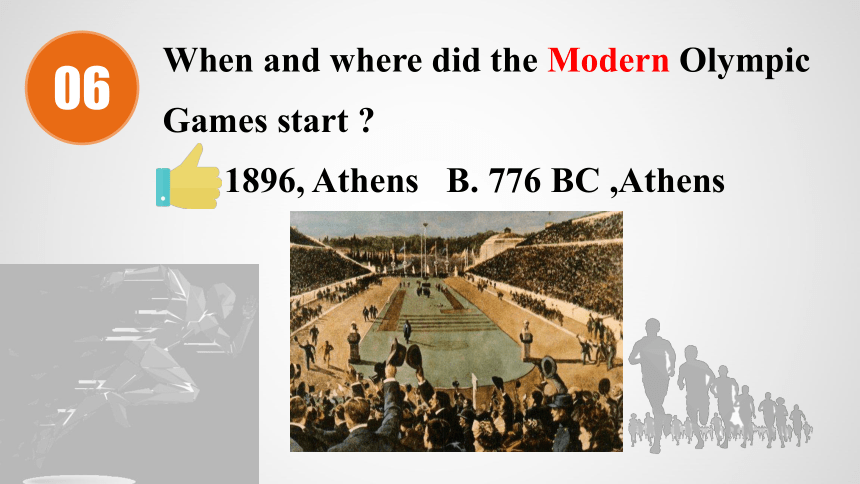
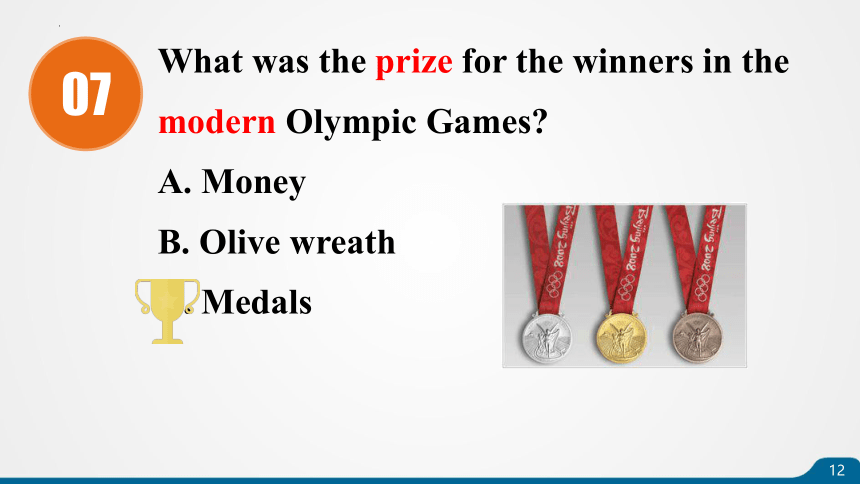
文档简介
(共37张PPT)
Unit 2 The Olympic Games
New Senior English For China Students' Book 2
Reading: An Interview
Lead-in
unit 2 –
the olympic games
How much do you know about the Olympic Games
Ancient Olympic Games
History
Modern Olympic Games
who
how often
where
prize
event
slaves
women
Micro-lesson on the history of the Olympic Games
01
When and where did the ancient (古代的) Olympic Games start
A. 1896, Rome B.776 BC ,Greece
.
.
02
Can women and slaves take part in the the ancient Olympic Games
A. Yes, they can B. No, they can’t
03
How many countries competed in the ancient Olympic Games
A. Only one, Greece
B.More than 200 countries
.
.
04
Which of the following is Not the event in the ancient Olympic Games
A. running
B. the chariot races 战车比赛
C. ice skating
05
What was the prize for the winners in the ancient Olympic Games
A. Money
B. Olive wreath
C. Medals
06
When and where did the Modern Olympic Games start
A. 1896, Athens B. 776 BC ,Athens
.
.
07
What was the prize for the winners in the modern Olympic Games
A. Money
B. Olive wreath
C. Medals
08
What are the three words that show the spirit/motto of the Olympic Games
.
.
swifter, higher , stronger
09
Where were the 2008 summer Olympic Games held
.
.
In China
10
Where will the next winter Olympic Games be held in 2022
.
.
In China
Prediction
How to know
An interview
Pausanias,
a Greek writer
about 2,000 years ago
Modern Olympic Games
on a magical journey
When
Why (Purpose)
Who (interviewer)
Who (interviewee)
What?(topic)
An interview
Olympic Games
P's purpose----to find out present-day Olympic Games
March 18th, 2007
Task 1 Fast reading for genre (文体)/structure
Li Yan, a volunteer for 2008 Olympic Games
Pausanias, a Greek writer about 2000 years ago
Part 1
Line 1- 4
An interview
Task 1 Fast reading for genre (文体)/structure
Line 1-4
Line 5-53
A brief to the interview
Part 1
The .
Part 2
An introduction to the interview
The interview
Task 1 Fast reading for genre (文体)/structure
添加文字
添加文字
添加文字
Part 2
An interview
Start
End
Process
Line 5-11
Line 53
Line12-52
the start of the interview
Task 1 Fast reading for genre (文体)/structure
P: My name is Pausanias. I lived in what you call “Ancient Greece” and I used to write about the Olympic Games a long time ago. I've come to your time to find out about the present-day Olympic Games because I know that in 2004 they were held in my homeland. May I ask you some questions about the modern Olympics
Line 5-11
Self-introduction
Purpose
the process of the interview
Task 1 Fast reading for genre (文体)/structure
Line 12-52
Questions & Answers
What questions did Pausanias ask
line 12 : How often do you hold your Games
line 17: Winter Games How can the runners enjoy competing in winter And what about the horses
line 26: Do you mean the Greek world
line 33: Where are all the athletes housed
line 36: Does anyone want to host the Olympic Games
line 49:Did you say medals Do you compete for prize money too
the end of the interview
Task 1 Fast reading for genre (文体)/structure
Line 53
P:Well, that’s good news. How interesting!
Thank you so much for your time.
Interview tip : Be polite and express at last
thanks
Task 1 Fast reading for genre (文体)
添加文字
添加文字
Questions
添加文字
Tips !
An interview
Start
End
Process
Thanks !
Self-troduction!
Purpose !
Task 2 Careful reading for information
Motto: .
only in .
.
anyone from any if they are good enough; play an important role
.
over 250
Every four years in summer
.
How to award(奖励) the winners
Where to hold the Olympics
When / How often are the Olympics held
What events are there
Who are allowed to compete
Why do athletes compete (spirit)
Motto: .
.
.
competes to host the Games
The ancient Olympics
The modern Olympics
VS
Every four years
both in summer and winter
Only a few
no women, no slaves, no other countries
anyone from any country if they are good enough;women play an important role
only in Greece
every country competes to host the Games
Olive wreath
Medals
Motto: swifter,higher, stronger
Line 12- 52
Critical reading for meaning
Reading
circles:
添加文本3
添加文本1
添加文本2
B
D
F
A
c
E
Student
Summarizer
What has changed about Olympics In what ways
Why do we need the Olympics Can we abolish (废除) them
Make an interview!
Discussion
leader
Connector
Critical reading for meaning
Other groups' opinions
Sharing in groups
Presentation to the class
Teacher's feedback
individual
work
STEP 2
STEP 1
STEP 3
STEP 4
STEP 5
Reading circles
changes
Critical reading for meaning
* in summer
* fewer events
* fewer athletes
* one country
* both in summer and winter
* more events
* more athletes
* more countries
the same spirit
Ancient Olympic Games
the same spirit
Modern Olympic Games
* no women
* no slaves
anyone who is good enough
frequent
various
competitive
equal
Development
Inheritance (继承)
Unchanged
Summarizer
Past
Present
literally,
(表面上)
a magical interview
an introduction to ancient and present-day Olympic Games
inheritance and development
actually,
Critical reading for meaning
a real conversation between two civilizations (文明)and cultures
Critical reading for meaning
Why do we need the Olympic Games
Can we abolish(废除) the Olympic Games
Discussion leader
2
1
3
4
6
5
unity
cooperation
communication
peace
development
friendship
Critical reading for meaning
...
Critical--reading for meaning
Make an interview
Case 1: In 2012 London Olympic Games, eight badminton players, who threw a match (故意放水), were disqualified (取消资格) from the games.
Case 2: In 2018 Winter Olympics in PyeongChang, Russian were banned (禁止) from taking part as a national team by the IOC because of doping (兴奋剂).
Connector
Interview Tips:
1.Introduce yourself, tell your purpose at first;
2.Based on the information provided, new questions will be put forward;
3.Repeat and confirm (确认) the key information of the interview;
4.Express your thanks at last
Connector
Critical--reading for meaning
Unchanged Olympic Spirits:
Swifter--Higher--Stronger
Process Result
Process !
“The most important thing in the Olympic Games is not to win but to take part, just as the most important thing in life is not the victory (胜利) but the struggle. The essential thing is not to have conquered but to have fought well.”
Just enjoy the
process of life!
Pierre de Coubertin
The Father
of Modern Olympics
What have we learnt from this lesson
Genre
Interview
Interviewer
interviewee
Reading skills
Skim for the
structure
Scan for key information
Comparison
Critical reading
Knowledge
Frequent
diverse
equal
competitive
unchanged spirits
Sum up
.
In groups do some research either in books or on the internet to find out more about the Olympic Games. Produce a booklet or posters with all your information and display it in your classroom.
Assignment
Group Competition:
I
III
II
Evaluation
+
thank you !
Unit 2 The Olympic Games
New Senior English For China Students' Book 2
Reading: An Interview
Lead-in
unit 2 –
the olympic games
How much do you know about the Olympic Games
Ancient Olympic Games
History
Modern Olympic Games
who
how often
where
prize
event
slaves
women
Micro-lesson on the history of the Olympic Games
01
When and where did the ancient (古代的) Olympic Games start
A. 1896, Rome B.776 BC ,Greece
.
.
02
Can women and slaves take part in the the ancient Olympic Games
A. Yes, they can B. No, they can’t
03
How many countries competed in the ancient Olympic Games
A. Only one, Greece
B.More than 200 countries
.
.
04
Which of the following is Not the event in the ancient Olympic Games
A. running
B. the chariot races 战车比赛
C. ice skating
05
What was the prize for the winners in the ancient Olympic Games
A. Money
B. Olive wreath
C. Medals
06
When and where did the Modern Olympic Games start
A. 1896, Athens B. 776 BC ,Athens
.
.
07
What was the prize for the winners in the modern Olympic Games
A. Money
B. Olive wreath
C. Medals
08
What are the three words that show the spirit/motto of the Olympic Games
.
.
swifter, higher , stronger
09
Where were the 2008 summer Olympic Games held
.
.
In China
10
Where will the next winter Olympic Games be held in 2022
.
.
In China
Prediction
How to know
An interview
Pausanias,
a Greek writer
about 2,000 years ago
Modern Olympic Games
on a magical journey
When
Why (Purpose)
Who (interviewer)
Who (interviewee)
What?(topic)
An interview
Olympic Games
P's purpose----to find out present-day Olympic Games
March 18th, 2007
Task 1 Fast reading for genre (文体)/structure
Li Yan, a volunteer for 2008 Olympic Games
Pausanias, a Greek writer about 2000 years ago
Part 1
Line 1- 4
An interview
Task 1 Fast reading for genre (文体)/structure
Line 1-4
Line 5-53
A brief to the interview
Part 1
The .
Part 2
An introduction to the interview
The interview
Task 1 Fast reading for genre (文体)/structure
添加文字
添加文字
添加文字
Part 2
An interview
Start
End
Process
Line 5-11
Line 53
Line12-52
the start of the interview
Task 1 Fast reading for genre (文体)/structure
P: My name is Pausanias. I lived in what you call “Ancient Greece” and I used to write about the Olympic Games a long time ago. I've come to your time to find out about the present-day Olympic Games because I know that in 2004 they were held in my homeland. May I ask you some questions about the modern Olympics
Line 5-11
Self-introduction
Purpose
the process of the interview
Task 1 Fast reading for genre (文体)/structure
Line 12-52
Questions & Answers
What questions did Pausanias ask
line 12 : How often do you hold your Games
line 17: Winter Games How can the runners enjoy competing in winter And what about the horses
line 26: Do you mean the Greek world
line 33: Where are all the athletes housed
line 36: Does anyone want to host the Olympic Games
line 49:Did you say medals Do you compete for prize money too
the end of the interview
Task 1 Fast reading for genre (文体)/structure
Line 53
P:Well, that’s good news. How interesting!
Thank you so much for your time.
Interview tip : Be polite and express at last
thanks
Task 1 Fast reading for genre (文体)
添加文字
添加文字
Questions
添加文字
Tips !
An interview
Start
End
Process
Thanks !
Self-troduction!
Purpose !
Task 2 Careful reading for information
Motto: .
only in .
.
anyone from any if they are good enough; play an important role
.
over 250
Every four years in summer
.
How to award(奖励) the winners
Where to hold the Olympics
When / How often are the Olympics held
What events are there
Who are allowed to compete
Why do athletes compete (spirit)
Motto: .
.
.
competes to host the Games
The ancient Olympics
The modern Olympics
VS
Every four years
both in summer and winter
Only a few
no women, no slaves, no other countries
anyone from any country if they are good enough;women play an important role
only in Greece
every country competes to host the Games
Olive wreath
Medals
Motto: swifter,higher, stronger
Line 12- 52
Critical reading for meaning
Reading
circles:
添加文本3
添加文本1
添加文本2
B
D
F
A
c
E
Student
Summarizer
What has changed about Olympics In what ways
Why do we need the Olympics Can we abolish (废除) them
Make an interview!
Discussion
leader
Connector
Critical reading for meaning
Other groups' opinions
Sharing in groups
Presentation to the class
Teacher's feedback
individual
work
STEP 2
STEP 1
STEP 3
STEP 4
STEP 5
Reading circles
changes
Critical reading for meaning
* in summer
* fewer events
* fewer athletes
* one country
* both in summer and winter
* more events
* more athletes
* more countries
the same spirit
Ancient Olympic Games
the same spirit
Modern Olympic Games
* no women
* no slaves
anyone who is good enough
frequent
various
competitive
equal
Development
Inheritance (继承)
Unchanged
Summarizer
Past
Present
literally,
(表面上)
a magical interview
an introduction to ancient and present-day Olympic Games
inheritance and development
actually,
Critical reading for meaning
a real conversation between two civilizations (文明)and cultures
Critical reading for meaning
Why do we need the Olympic Games
Can we abolish(废除) the Olympic Games
Discussion leader
2
1
3
4
6
5
unity
cooperation
communication
peace
development
friendship
Critical reading for meaning
...
Critical--reading for meaning
Make an interview
Case 1: In 2012 London Olympic Games, eight badminton players, who threw a match (故意放水), were disqualified (取消资格) from the games.
Case 2: In 2018 Winter Olympics in PyeongChang, Russian were banned (禁止) from taking part as a national team by the IOC because of doping (兴奋剂).
Connector
Interview Tips:
1.Introduce yourself, tell your purpose at first;
2.Based on the information provided, new questions will be put forward;
3.Repeat and confirm (确认) the key information of the interview;
4.Express your thanks at last
Connector
Critical--reading for meaning
Unchanged Olympic Spirits:
Swifter--Higher--Stronger
Process Result
Process !
“The most important thing in the Olympic Games is not to win but to take part, just as the most important thing in life is not the victory (胜利) but the struggle. The essential thing is not to have conquered but to have fought well.”
Just enjoy the
process of life!
Pierre de Coubertin
The Father
of Modern Olympics
What have we learnt from this lesson
Genre
Interview
Interviewer
interviewee
Reading skills
Skim for the
structure
Scan for key information
Comparison
Critical reading
Knowledge
Frequent
diverse
equal
competitive
unchanged spirits
Sum up
.
In groups do some research either in books or on the internet to find out more about the Olympic Games. Produce a booklet or posters with all your information and display it in your classroom.
Assignment
Group Competition:
I
III
II
Evaluation
+
thank you !
